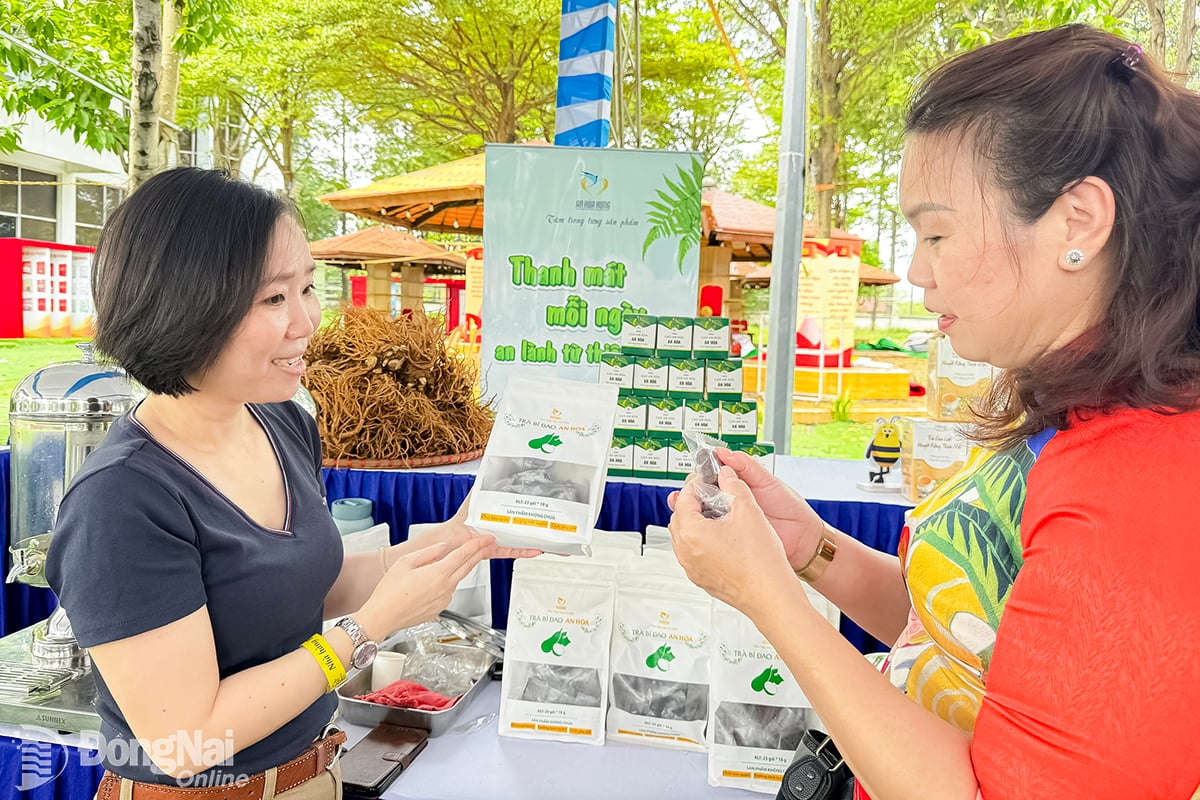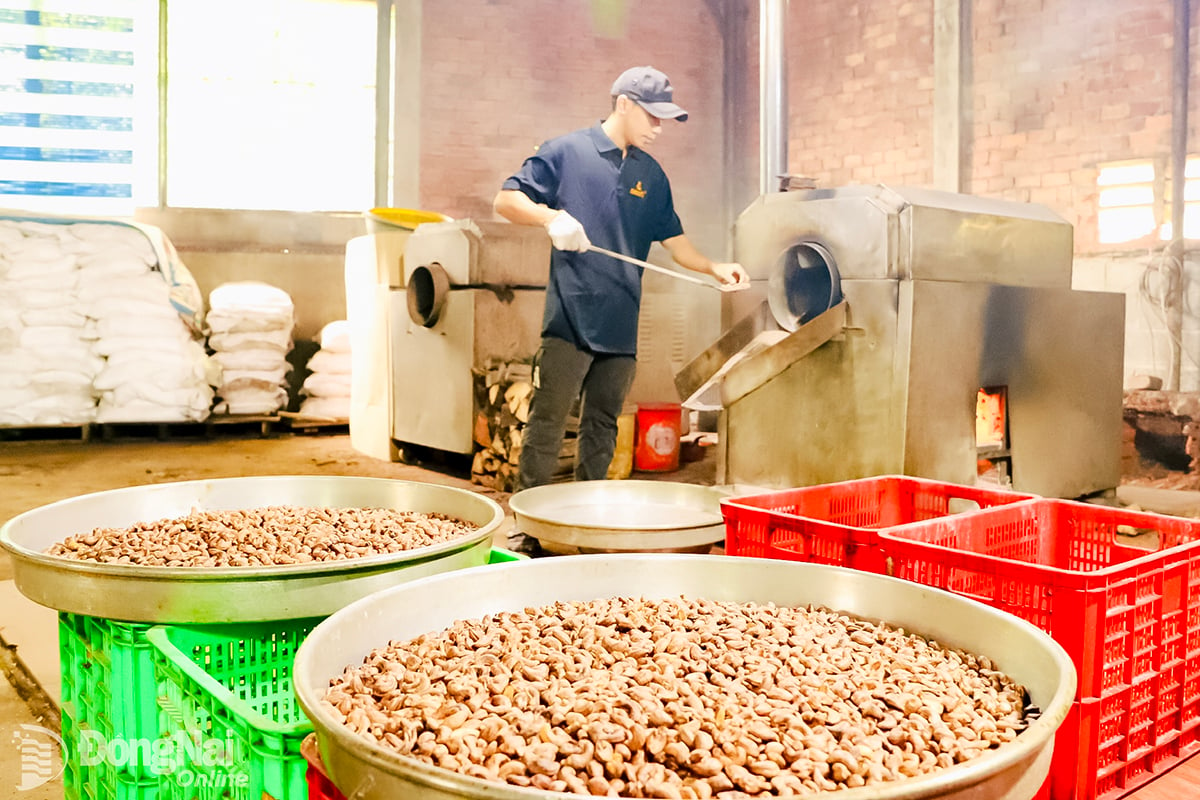 |
| Winter melon tea from An Hoa Hung establishment in Long Hung ward, Dong Nai province, participated in a trade promotion event in Tran Bien ward. Photo: Binh Nguyen |
Dong Nai's traditional specialties are entirely handcrafted, meticulously prepared from the selection of ingredients to each stage of processing. It is this sophistication and dedication that creates their distinctive flavor, making consumers willing to pay a high price to enjoy them.
This is a niche market with great potential, attracting bold investment from many local farmers and businesses, gradually building brands for handcrafted specialty products that reflect the unique identity of Dong Nai.
Delicious, handcrafted dishes are in high demand.
The fresh cashew nuts roasted over a wood fire using traditional methods by Hoang Phu Cashew Company Limited, Loc Tan commune, Dong Nai province, have received numerous certifications for brand and quality. The product was certified as a typical Vietnamese brand by the Ministry of Industry and Trade and nominated to represent the Vietnamese cashew industry at the Guangzhou International Cashew Fair in China in 2013. The company also received the Tam Nong Golden Cup from the Central Committee of the Vietnam Farmers' Association ; was selected as a Class A product in the ready-to-eat food group by the Vietnam Cashew Association; and was certified as a typical Vietnamese brand for consumer rights by the Vietnam Union of Science and Technology Associations…
Mr. Hoang Chuan, Director of Hoang Phu Cashew Company Limited in Loc Tan commune, said: "Thanks to its delicious taste and meticulous handcrafted processing, Hoang Phu's wood-roasted cashews are priced from 360,000 to 500,000 VND/kg at the factory. They are sold through high-end distribution channels, and in many places, customers are willing to pay millions of VND to buy the product."
Recounting his entrepreneurial journey in processing traditional wood-roasted cashew nuts, Mr. Hoang Chuan, Director of Hoang Phu Cashew Company Limited, shared: “In the past, I specialized in purchasing agricultural products. I noticed that the cashews from my hometown were fragrant and delicious, unmatched by many other places, yet the quality products were exported. From that, I thought about investing in processing. With a sincere heart, I wanted to create and build a cashew brand right from the cashew nut growing region of the province.”
He started his business with two cast-iron pans for roasting cashews using traditional methods. Later, he invented his own wood-fired cashew roasting oven, a solution that won the Technical Innovation Award of the former Binh Phuoc province.
Mr. Hoang Chuan stated: The company has invested in drying yards and storage facilities capable of holding 400-500 tons of cashew nuts, ensuring a year-round supply of raw materials for processing. These cashew nuts are sourced directly from the cashew-growing regions of the Khmer and S'tieng ethnic minorities in the border communes of Loc Ninh and Bu Dop, where cultivation is purely natural, ensuring a high-quality and safe supply of cashew nuts.
During processing, the company focuses on selecting and sorting to obtain the highest quality cashew nuts; using firewood from longan trees in the North, which produces less smoke and burns steadily, also contributes to the delicious and rich flavor.
The delicious product spread to the market naturally, starting with local people buying it for personal use and as gifts. The good reputation spread far and wide, and the wood-fired roasted cashew nuts from the farm gradually reached all parts of the country and even abroad.
The traditional rice wine of the M'nong and S'tieng ethnic groups in Bu Gia Map commune is made using a unique, meticulous, and handcrafted method. Most notably, the M'nong people create their yeast from naturally growing leaves in the forest. These leaves are chopped, pounded in a mortar, and then dried. The rice used for the wine must be cooked thoroughly, but not too mushy or too dry, before being mixed with the yeast. Previously, the people only brewed wine for family or community use. In recent years, with the development of tourism, the Dak Mai Agricultural and Forestry Service Cooperative in Bu Gia Map commune has focused on investing in processing and developing the market for this specialty rice wine. The goal is to maintain and preserve the traditional rice wine-making techniques of the local ethnic groups, turning the local product into a tourism product to increase income for its members.
An opportunity to promote local specialties.
Many local specialties, meticulously prepared using traditional handcrafted methods, have attracted consumers who are willing to pay high prices to enjoy them. Seizing this opportunity, many processing facilities and farmers have invested in processing these specialties to supply the market.
 |
| The cashew nut roasting process at Hoang Phu Cashew Company Limited, Loc Tan commune. Photo: Binh Nguyen |
An Hoa Hung Enterprise in Long Hung Ward, Dong Nai Province, has recently introduced its An Hoa winter melon tea product to the market. What's special about this tea is that it's presented to consumers in the form of a soft, chewy paste cut into small, convenient tablets that easily dissolve in room-temperature water, making it very easy to use. In addition, the enterprise's previously introduced ginseng tea product has also been well-received by consumers.
Ms. Hoang Thi Kim Anh, owner of An Hoa Hung business establishment, said: "The special thing about the new products that the establishment is that they are all meticulously handcrafted using fresh, natural ingredients. Specifically, the winter melon tea is made with green winter melon grown using safe farming practices in Ha Giang province, combined with ingredients beneficial to health such as molasses, luohan fruit, and rehmannia root. The ginseng stewed tea includes ingredients such as rehmannia root, yam, codonopsis root, chuanxiong, glutinous coix seeds (ground while retaining the bran), goji berries, and red dates. These ingredients are all pre-processed and prepared by the establishment using fresh, traditional methods, thus enhancing the flavor and deliciousness of the dishes."
Corn flakes, sticky rice flakes, and "bánh khảo" cakes are all prepared using traditional handcrafted methods, reflecting the unique cultural identity of the Tay and Nung ethnic groups in Thuan Loi commune. The "bánh khảo" cakes are made from corn or sticky rice. The corn and sticky rice grains are puffed until crispy using a traditional method, and malt syrup and ginger are cooked manually, mixed with the puffed rice, and then pressed into bite-sized pieces. "Bánh khảo" cakes are made from puffed sticky rice, which is then ground into flour. This is a traditional cake of the Tay ethnic group, offered to the ancestral altar during Tet (Lunar New Year), with the belief of wishing for good fortune and blessings in the new year.
Mr. Thach Ni, Chairman of the Farmers' Association of Thuan Loi commune, said: "Previously, people only made this dish during holidays and Tet (Lunar New Year), but in recent years, with the development of tourism, tourists and locals have a demand for local specialties, so many families process this dish year-round to supply the market, contributing to increased income."
In recent years, farmers in Loc Thanh commune have shifted to cultivating and processing specialty products for the market. Specifically, nearly 20 households in the commune currently grow sương sâm leaves, and some process them into dried sương sâm leaf products. This product line is gaining market attention because dried sương sâm leaves offer a fresh and delicious taste comparable to fresh leaves. This product has the advantage of long shelf life and the potential for expanding distribution channels due to its convenient dried form. In addition, the locality also has a specialty product: chùm buông wine – a wine brewed entirely using traditional methods. Because it is a unique specialty with many health benefits, it is currently sold in the high-end market segment at prices reaching millions of dong per liter.
Plains
Source: https://baodongnai.com.vn/dong-nai-cuoi-tuan/202511/dac-san-che-bien-thu-cong-hut-hang-fb504b4/




![[Photo] General Secretary To Lam working with the Central Inspection Committee](https://vphoto.vietnam.vn/thumb/1200x675/vietnam/resource/IMAGE/2026/03/05/1772718314670_a1-bnd-8682-5192-jpg.webp)

![[Photo] Prime Minister Pham Minh Chinh receives the Minister of Emergency Situations of the Russian Federation.](https://vphoto.vietnam.vn/thumb/1200x675/vietnam/resource/IMAGE/2026/03/05/1772712011395_ndo_br_thiet-ke-chua-co-ten-76-png.webp)







































































































Comment (0)